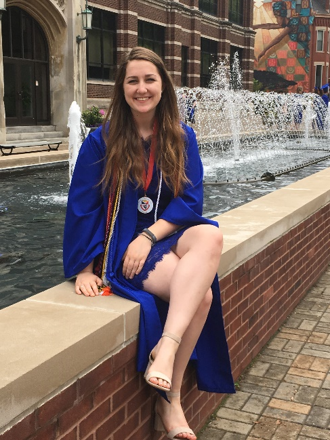
Name: Anna Saylor
Earned Degree(s): Bachelor’s
Program of study/Year in program: 2nd year of master’s program
Mentor/Advisor: Dr. Sarah E. Wallace
University: Duquesne University
ANCDS Fellowship Mentor: Dr. Melissa Johnson
1. Why were you interested in the ANCDS conference fellow program?
Dr. Sarah Wallace introduced the idea of applying for the fellowship. When I realized I could have the opportunity to meet people who literally wrote the books on these topics, I could not pass it up! I knew it would be an incredible chance to learn from top researchers and clinicians in this area.
2. What did you enjoy about the ANCDS conference fellow program?
It’s going to sound a bit weird…but I loved getting to watch everyone interact with each other. It was really uplifting to see how much everyone loves to collaborate with each other and how genuinely happy everyone seemed to catch up with one another, both personally and professionally. Joining these conversations is something I look forward to in my own career.
3. Why would you recommend the ANCDS conference fellow program to future students?
Getting to network with other students and professionals who are passionate about neurogenic communication is amazing. Being a master’s student and considering my career/academia path, it was invaluable to get perspectives from people working clinically, obtaining their PhD, working as a postdoc, and working in academia.
4. Based on this first introduction to ANCDS, what are the benefits to students, clinicians, and/or researchers?
Speaking as someone who is about to enter the professional world, it’s easy to know you are implementing the best practices when you are learning from the best in the field.
5. Describe your current or recent research project.
My master’s thesis has been focused on environmental modifications for persons with aphasia, specifically medication instructions. I’m looking at the impact of using aphasia-friendly modifications and the effects on comprehension for functional, independent medication management. I also included a control group to see if modifications are warranted for people without a language impairment to better understand complex health information.
6. Why were you interested in the above project?
My grandfather had Alzheimer’s and dementia with a pretty rigorous medication schedule. While my grandmother was the one managing his medications, our family noticed that it eventually became too much for my grandmother just with normal aging. I wanted to see if anything would help make it a bit easier for people in similar situations to manage their own medications and understand relevant information.
